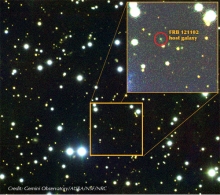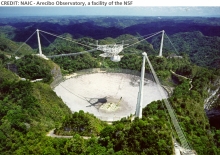Astronomers at McGill University, MIT and elsewhere have detected a strange and persistent radio signal from a far-off galaxy, that appears to be flashing with surprising regularity. Classified as a fast radio burst, or FRB, this new signal persists for up to three seconds, about 1,000 times longer than the average FRB. Within this window, the team detected bursts of radio waves that repeat every 0.2 seconds in a clear periodic pattern.

Astronomers have pinpointed for the first time the home galaxy of a Fast Radio Burst, moving scientists a step closer to detecting what causes these powerful but fleeting pulses of radio waves. FRBs, which last just a few thousandths of a second, have puzzled astrophysicists since their discovery a decade ago.

By Chris Chipello, McGill Newsroom
Astronomers for the first time detect repeat ‘fast radio bursts’ from same sky location
Astronomers for the first time have detected repeating short bursts of radio waves from an enigmatic source that is likely located well beyond the edge of our Milky Way galaxy. The findings indicate that these “fast radio bursts” come from an extremely powerful object which occasionally produces multiple bursts in under a minute.

